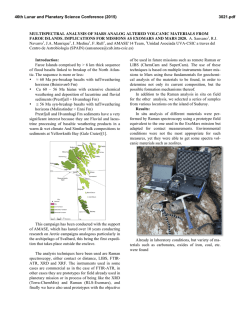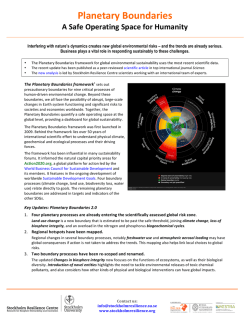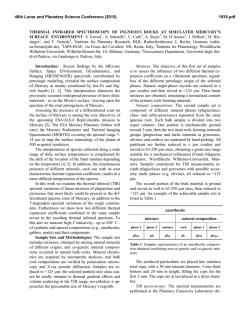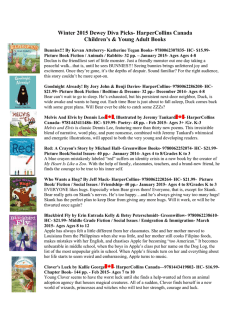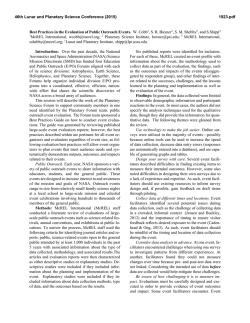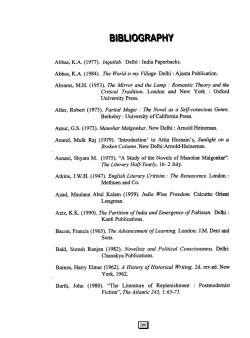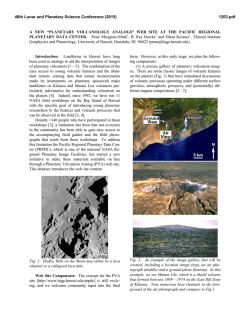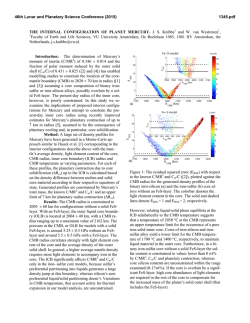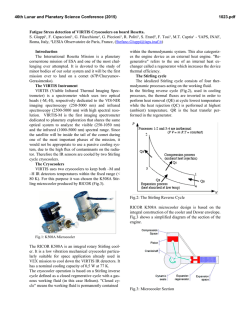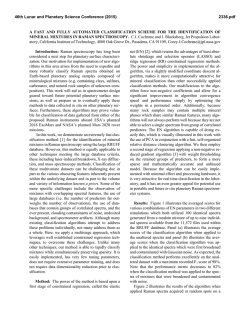
Literary production in science fiction like a tool for teaching planetary
46th Lunar and Planetary Science Conference (2015) 2461.pdf Literary production in science fiction like a tool for teaching planetary sciences in Colombia. J. Torres1, F. Saavedra1 and D. Tovar 1,2. 1Grupo de Ciencias Planetarias y Astobiología – TITAN, Department of Geosciences, Universidad Nacional de Colombia, Carrera 45 No 26-85 Edificio 224, Bogotá D.C., Colombia, [email protected] . 2Department of Earth and Environmental Sciences, University of Minnesota, 229 Heller Hall 1114 Kirby Drive, Duluth, MN 55812, USA Introduction: A considerable development and improvement in science and technology has been currently obtained thanks to the vision of some human beings who have tried to find answers to many questions. Some ideas and new concepts have been condensed in literary and audiovisual production within science fiction genre [1]. Science fiction has played a key role particularly in planetary sciences issues; two subgenres, hard science fiction and space opera, are very close to this field. A significant factor to scientific knowledge is undisclosed literary production in science fiction like an attractive option to communicate science in a simplified, attractive and dynamic way. Part of our work this year on a project carried out between Universidad National de Colombia and Bogotá’s Secretary of Education, we had the opportunity to teach a series of workshops on science fiction and literary production and its relationship with sciences planetary. The activities were focused to a principal target: students of public schools without access to high education. These workshops had the capability to discover that dissemination of scientific knowledge to general public through literary production, particularly in science fiction, facilitates enormously the comprehension of science and motivates young people to continue their studies in areas related to science. Workshops. For the diffusion of science a series of workshops were created in order to explain how literary production associated with science fiction to from putting in context what is science fiction and its various generous various activities in which tasks are assigned to students as performed produce texts related to both science fiction sub generous discussed at the workshop were hard science fiction and space opera with these texts some stories were built; then the Fig 1. Screenshot of workshop slides: the teaching of science through reading and writing of science fiction. correctness of these texts in relation to their possible scientific veracity or could be justified from mathematics, physics, chemistry , biology and geology giving them basic to expand their knowledge in science parameters was analyzed , subsequently deal give small related to planetary science and are proposed to classify your favorite movie genres and find the relationship you have this literary genre analyzing some authors like Jules Verne and HG Wells, and its importance in areas such as spatial contexts contemporary events and programs of space, exploration including the most recent missions [2] and the current state of science and technology in modern societies . Fig 2. Screenshot of workshop slides: the teaching of science through reading and writing of science fiction. 46th Lunar and Planetary Science Conference (2015) 2461.pdf Educational Impact. Science fiction as a literary genre gives us the ability to spread planetary science in a simple and attractive way for the general public especially for teen audience and is an interesting proposal that can be taken into account as a form of dissemination and teaching of science in schools and in the case of the series of workshops showed good results to arouse the interest of the public due to the attractiveness of the concept of allowing students to use their imagination as part of the learning process. Fig 4. The science fictional solar system of Isaac Asimov and the quiet war of Paul McAvley are two examples of the relationship that keeps the literary production of science fiction to the study of science and specifically these two books in teaching planetary science. Fig 3. Synoptic table of process in workshops. Public disclosure. In our country there is a growing interest in all scientific subjects , as some drawbacks in primary and secondary education in college students go unprepared in basic areas of knowledge and students sometimes have difficulty forming in science are presented therefore it is important to consider alternative ways of disseminating knowledge that are attractive to students and can be the basis for forming generations interested in scientific knowledge and innovation in science and technology for development of the country and Latin America since education is the way to reduce the inequality gap ; thus can strengthen science and technology in our country as well as being an engine to spread planetary science. Additionally dissemination of knowledge is also essential in the research group of which I am part is TITAN Planetary Sciences Group has previously participated in this annual conference and is currently in the midst of a generational reason all these tools are taken into account as one of the axes of the group is distributing planetary science in the country because we are the first group of this area created in Colombia. Conclusions. The literary production in the genre of science fiction is an effective way of disseminating scientific knowledge and teaching planetary science to the general public. References. [1] Ramirez D, Martinez L, Castellanos O, (2012) divulgación y difusión del conocimiento 27-36. [2] Fraknoi A, (2014) Science Fiction Stories with Good Astronomy & Physics: A Topical Index.
© Copyright 2026
